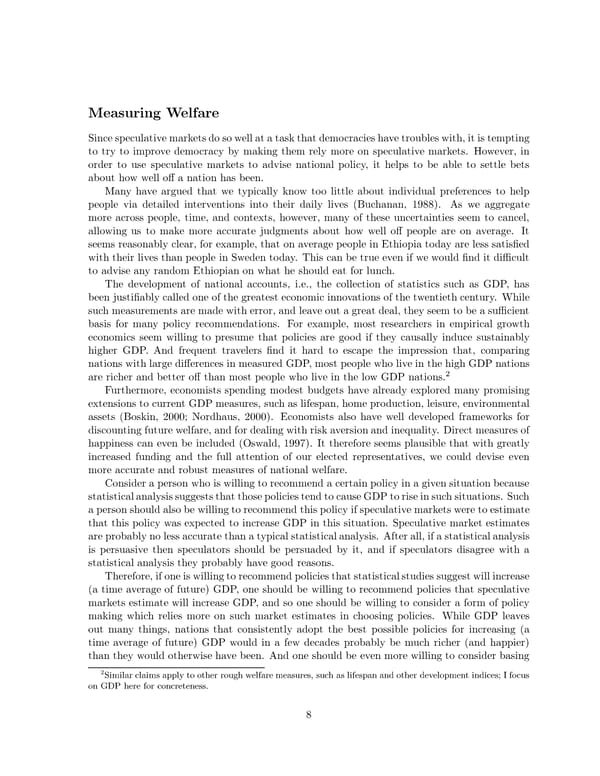Measuring Welfare Since speculative marketsdo so well at a task that democracies have troubles with, it is tempting to try to improve democracy by making them rely more on speculative markets. However, in order to use speculative markets to advise national policy, it helps to be able to settle bets about how well off a nation has been. Many have argued that we typically know too little about individual preferences to help people via detailed interventions into their daily lives (Buchanan, 1988). As we aggregate more across people, time, and contexts, however, many of these uncertainties seem to cancel, allowing us to make more accurate judgments about how well off people are on average. It seems reasonably clear, for example, that on average people in Ethiopia today are less satisfied with their lives than people in Sweden today. This can be true even if we would find it difficult to advise any random Ethiopian on what he should eat for lunch. The development of national accounts, i.e., the collection of statistics such as GDP, has been justifiably called one of the greatest economic innovations of the twentieth century. While such measurements are made with error, and leave out a great deal, they seem to be a sufficient basis for many policy recommendations. For example, most researchers in empirical growth economics seem willing to presume that policies are good if they causally induce sustainably higher GDP. And frequent travelers find it hard to escape the impression that, comparing nations with large differences in measured GDP, most people who live in the high GDP nations are richer and better off than most people who live in the low GDP nations.2 Furthermore, economists spending modest budgets have already explored many promising extensions to current GDP measures, such as lifespan, home production, leisure, environmental assets (Boskin, 2000; Nordhaus, 2000). Economists also have well developed frameworks for discounting future welfare, and for dealing with risk aversion and inequality. Direct measures of happiness can even be included (Oswald, 1997). It therefore seems plausible that with greatly increased funding and the full attention of our elected representatives, we could devise even more accurate and robust measures of national welfare. Consider a person who is willing to recommend a certain policy in a given situation because statisticalanalysissuggeststhat thosepoliciestend to causeGDPtoriseinsuch situations. Such a person should also be willing to recommend this policy if speculative markets were to estimate that this policy was expected to increase GDP in this situation. Speculative market estimates are probably no less accurate than a typical statisticalanalysis. After all, if a statistical analysis is persuasive then speculators should be persuaded by it, and if speculators disagree with a statistical analysis they probably have good reasons. Therefore, if one is willing to recommend policies that statisticalstudies suggest will increase (a time average of future) GDP, one should be willing to recommend policies that speculative markets estimate will increase GDP, and so one should be willing to consider a form of policy making which relies more on such market estimates in choosing policies. While GDP leaves out many things, nations that consistently adopt the best possible policies for increasing (a time average of future) GDP would in a few decades probably be much richer (and happier) than they would otherwise have been. And one should be even more willing to consider basing 2Similar claims apply to other rough welfare measures, such as lifespan and other development indices; I focus on GDP here for concreteness. 8
 Shall We Vote on Values, But Bet on Beliefs? Page 9 Page 11
Shall We Vote on Values, But Bet on Beliefs? Page 9 Page 11